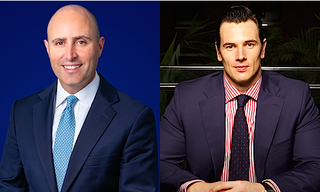Daniel Roarty: «Do Financials Have a Role in Sustainable Portfolios?»
Financial companies that help address some of the world’s most pressing socioeconomic challenges deserve attention from sustainability-focused investors, Daniel Roarty writes in an article on finews.first.
When investors think about sustainability, environmental objectives and climate change are usually front and center. But social goals are also important, and financial companies play a vital yet underappreciated role in promoting sustainable development. However, financial firms are not often recognized as key players in addressing issues related to sustainability. Yet the United Nations Sustainable Development Goals (SDGs) highlight financial systems as targets for achieving important socio-economic objectives.
Beneath the surface of every economy and society, financial markets ensure that capital flows freely to and from businesses and people. Academic research has long established the importance of well-developed stock markets in fostering economic growth via improved resource allocation, competition and innovation. Exchanges also help manage risks by reducing the volatility of asset price movements that could undermine monetary stability or employment.
When markets are destabilized, everyone pays the price. Banks scale back lending, first to individuals with lower credit health and to small and medium-sized enterprises. Asset prices collapse and payments are delayed. Stock market instability shatters confidence in the financial and economic system, with devastating consequences for people’s savings and pensions. Those with less of a financial cushion to fall back on often suffer most in a financial crisis.
«Better financial data is an essential ingredient to promote financial inclusion»
Transparency and liquidity are the foundation of stable markets, creating a level playing field for all market participants, including those traditionally underserved or excluded from the financial system. To promote transparency and liquidity, exchanges collect a vast array of data from companies and market participants. In some cases, this information is provided to regulators to help them oversee markets. As an enforcer of rules and regulations, exchanges aim to ensure that market participants behave fairly and ethically, protecting all investors.
Critics might argue that exchanges only serve wealthy investors. We disagree. From individuals seeking a loan to buy a house or car, to a business seeking to access capital for growth, a functioning financial market and economic stability benefit everyone. If transparency and liquidity are the heart of a healthy, functioning financial market for all of society, data are its lifeblood. Better financial data is an essential ingredient to promote financial inclusion.
«About 28 million people in the US and 4 to 5 million in the UK are credit invisible»
About 1.4 billion people worldwide still lack access to basic financial services and almost 850 million don’t have official proof of identity according to Experian, the Ireland-based consumer credit reporting company. About 28 million people in the US and 4–5 million in the UK are «credit invisible» because their financial profiles are too limited for lenders to assess them, according to Experian. Without access to affordable finance, people can’t buy homes, secure healthcare, pursue an education or start a business.
Credit bureaus provide information on a borrower’s creditworthiness that enables banks to lend and set appropriate interest rates. Lower-income customers and small businesses often struggle to gain a credit profile because they lack a credit history and are invisible to the system. Yet today, credit bureaus have new ways to help people strengthen their credit profiles using utility bill payments and mobile phone data.
«Too many people are still left out of the traditional financial system entirely»
Credit bureaus have started allowing individuals to share information about the payments they’re making on time to help build or boost their credit score. This enables individuals to connect to the financial system, access cheaper sources of financing and tap additional services. Using data to improve credit profiles is a step in the right direction toward expanding financial inclusion, but too many people are still left out of the traditional financial system entirely.
Worldwide bank account ownership has improved over the last decade from 51 percent of adults over the age of 15 in 2011 to 76 percent in 2021, according to the World Bank. But in lower-income regions and countries, many people still lack access to the system. Many governments have strategic plans to address the problem. However, like most of the world’s sustainability challenges, financial inclusion can’t be achieved by the public sector alone.
Payment technology companies are critical for those who lack access to traditional bank accounts. In 2021, 57% of people in developing economies used digital payments, which are typically a gateway into other financial services, according to the World Bank. Mobile money is already commonplace in developed markets. These accounts help encourage saving and enable financial inclusion, particularly for lower-income people and women.
Digital Payment Use Has Grown Rapidly in Developing Economies
«Financial firms can be found that address some of the most pressing socioeconomic challenges»
Financial security is a multifaceted objective that must be addressed by a range of financial services firms, each contributing a solution to a distinct part of the problem. Insurance companies help manage threats to health, income and property that can devastate personal finances instantly. Life and health insurers that provide affordable protection and target at-risk segments of the population help families prepare for unexpected financial emergencies. Social finance services support the achievement of positive social outcomes in areas including basic infrastructure, access to essential services, affordable housing, employment, food security and microfinance.
With these examples in mind, we think equity investors focused on sustainability should take a fresh look at the financial sector. Guided by the SDGs, financial firms can be found that address some of the most pressing socioeconomic challenges of our age, which ultimately help reduce poverty, promote gender equality, support upward mobility and improve economic participation.
Ultimately, improved financial empowerment creates a virtuous circle that enhances economic growth and delivers economic benefits to a broader cross-section of society. Quality financial companies with clear competitive advantages and solid business models can allow investors to participate in efforts to empower individuals and small businesses as they strive to build a better financial future.
Daniel C. Roarty was appointed Chief Investment Officer of AB’s Sustainable Thematic Equities team, which manages a suite of geographically diverse strategies dedicated to the achievement of the United Nations (UN) Sustainable Development Goals (SDGs), in 2013. Since assuming this role, he has become a thought leader in socially responsible investing, utilizing the SDGs as a road map for identifying thematic investment opportunities.
Previous contributions: Rudi Bogni, Peter Kurer, Rolf Banz, Dieter Ruloff, Werner Vogt, Walter Wittmann, Alfred Mettler, Robert Holzach, Craig Murray, David Zollinger, Arthur Bolliger, Beat Kappeler, Chris Rowe, Stefan Gerlach, Marc Lussy, Nuno Fernandes, Richard Egger, Maurice Pedergnana, Marco Bargel, Steve Hanke, Urs Schoettli, Ursula Finsterwald, Stefan Kreuzkamp, Oliver Bussmann, Michael Benz, Albert Steck, Martin Dahinden, Thomas Fedier, Alfred Mettler, Brigitte Strebel, Mirjam Staub-Bisang, Nicolas Roth, Thorsten Polleit, Kim Iskyan, Stephen Dover, Denise Kenyon-Rouvinez, Christian Dreyer, Kinan Khadam-Al-Jame, Robert Hemmi, Anton Affentranger, Yves Mirabaud, Katharina Bart, Frédéric Papp, Hans-Martin Kraus, Gerard Guerdat, Mario Bassi, Stephen Thariyan, Dan Steinbock, Rino Borini, Bert Flossbach, Michael Hasenstab, Guido Schilling, Werner E. Rutsch, Dorte Bech Vizard, Adriano B. Lucatelli, Katharina Bart, Maya Bhandari, Jean Tirole, Hans Jakob Roth, Marco Martinelli, Thomas Sutter, Tom King, Werner Peyer, Thomas Kupfer, Peter Kurer, Arturo Bris, Frederic Papp, James Syme, Dennis Larsen, Bernd Kramer, Armin Jans, Nicolas Roth, Hans Ulrich Jost, Patrick Hunger, Fabrizio Quirighetti, Claire Shaw, Peter Fanconi, Alex Wolf, Dan Steinbock, Patrick Scheurle, Sandro Occhilupo, Will Ballard, Nicholas Yeo, Claude-Alain Margelisch, Jean-François Hirschel, Jens Pongratz, Samuel Gerber, Philipp Weckherlin, Anne Richards, Antoni Trenchev, Benoit Barbereau, Pascal R. Bersier, Shaul Lifshitz, Klaus Breiner, Ana Botín, Martin Gilbert, Jesper Koll, Ingo Rauser, Carlo Capaul, Markus Winkler, Thomas Steinemann, Christina Boeck, Guillaume Compeyron, Miro Zivkovic, Alexander F. Wagner, Eric Heymann, Christoph Sax, Felix Brem, Jochen Moebert, Jacques-Aurélien Marcireau, Ursula Finsterwald, Michel Longhini, Stefan Blum, Zsolt Kohalmi, Karin M. Klossek, Nicolas Ramelet, Søren Bjønness, Gilles Prince, Salman Ahmed, Peter van der Welle, Ken Orchard, Christian Gast, Jeffrey Bohn, Juergen Braunstein, Jeff Voegeli, Fiona Frick, Stefan Schneider, Matthias Hunn, Andreas Vetsch, Fabiana Fedeli, Kim Fournais, Carole Millet, Swetha Ramachandran, Thomas Stucki, Neil Shearing, Tom Naratil, Oliver Berger, Robert Sharps, Tobias Mueller, Florian Wicki, Jean Keller, Niels Lan Doky, Karin M. Klossek, Johnny El Hachem, Judith Basad, Katharina Bart, Thorsten Polleit, Peter Schmid, Karam Hinduja, Zsolt Kohalmi, Raphaël Surber, Santosh Brivio, Mark Urquhart, Olivier Kessler, Bruno Capone, Peter Hody, Michael Bornhaeusser, Agnieszka Walorska, Thomas Mueller, Ebrahim Attarzadeh, Marcel Hostettler, Hui Zhang, Michael Bornhaeusser, Reto Jauch, Angela Agostini, Guy de Blonay, Tatjana Greil Castro, Jean-Baptiste Berthon, Marc Saint John Webb, Dietrich Goenemeyer, Mobeen Tahir, Didier Saint-Georges, Serge Tabachnik, Vega Ibanez, David Folkerts-Landau, Andreas Ita, Michael Welti, Mihkel Vitsur, Fabrizio Pagani, Roman Balzan, Todd Saligman, Christian Kaelin, Stuart Dunbar, Carina Schaurte, Birte Orth-Freese, Gun Woo, Lamara von Albertini, Ramon Vogt, Andrea Hoffmann, Niccolò Garzelli, Darren Williams, Benjamin Böhner, Mike Judith, Jared Cook, Henk Grootveld, Roman Gaus, Nicolas Faller, Anna Stünzi, Thomas Höhne-Sparborth, Fabrizio Pagani, Guy de Blonay, Jan Boudewijns, Sean Hagerty, Alina Donets, Sébastien Galy, Roman von Ah, Fernando Fernández, Georg von Wyss, Stefan Bannwart, Andreas Britt, Frédéric Leroux, Nick Platjouw, Rolando Grandi, Philipp Kaupke, Gérard Piasko, Brad Slingerlend, Dieter Wermuth, Grégoire Bordier, Thomas Signer, Brigitte Kaps, Gianluca Gerosa, Christine Houston, Manuel Romera Robles, Fabian Käslin, Claudia Kraaz, Marco Huwiler, Lukas Zihlmann, Nadège Lesueur-Pène, Sherif Mamdouh, Harald Preissler, Taimur Hyat, Philipp Cottier, Andreas Herrmann, Camille Vial, Marcus Hüttinger, Ralph Ebert, Serge Beck, Alannah Beer, Stéphane Monier, Ashley Simmons, Lars Jaeger, Shanna Strauss-Frank, Bertrand Binggeli, Marionna Wegenstein, George Muzinich, Jian Shi Cortesi, Razan Nasser, Nicolas Forest, Joerg Ruetschi, Reto Jauch, Bernardo Brunschwiler, Charles-Henry Monchau, Philip Adler, Brigitte Kaps, Ha Duong, Teodoro Cocca, Beat Wittmann, Jan Brzezek, Florin Baeriswyl, Nicolas Mousset, Beat Weiss, Pascal Mischler, Andrew Isbester, Konrad Hummler, Jan Beckers, Martin Velten, Katharine Neiss, and Claude Baumann.






















